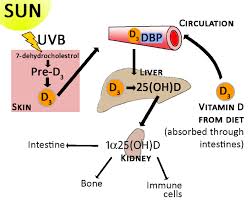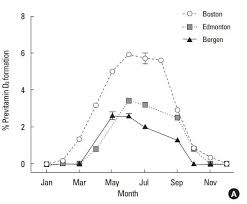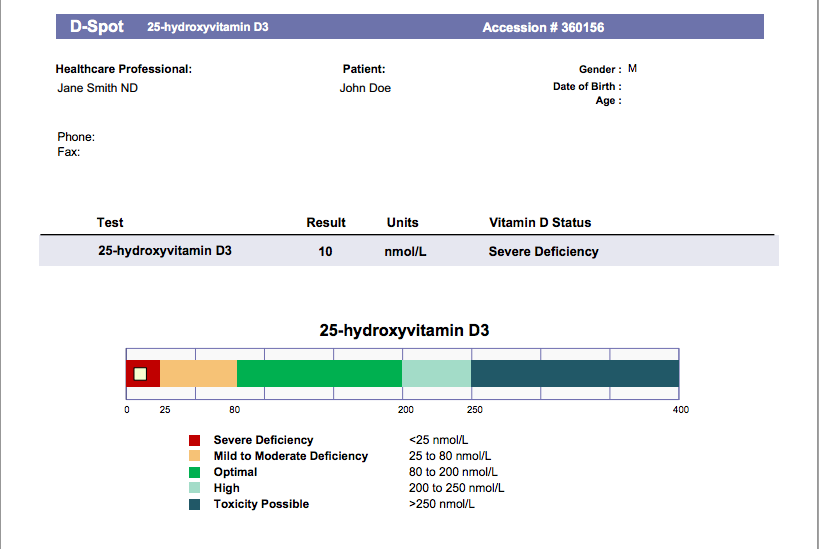|
Vitamin D, also cheerily known as the sunshine vitamin, is essential for our health and well being. It is mostly known for regulating calcium absorption to maintain strong bones, and that alone is an essential function. That is just the tip of the iceberg however, as Vitamin D also acts like a hormone and exerts a wide variety of health effects throughout the body. Vitamin D deficiency is associated with a host of health problems, ranging from infections and osteoporosis to high blood pressure and depression. It is estimated that only about one-third of Canadians have optimal Vitamin D levels. The Sunshine VitaminWhy do we call Vitamin D the sunshine vitamin? Because it is synthesized from a cholesterol precursor in our skin when we are exposed to the sun's UV-B rays. This compound then travels to the liver where it is converted into another form before the final activation is achieved in the kidneys. The final, active form is known as 1,25-dihydroxycholecalciferol. As can be seen in this diagram, Vitamin D synthesis relies on adequate exposure to UVB rays, as well as healthy liver and kidney function. Therefore, possible causes of Vitamin D deficiency include lack of sun exposure (more on this below), as well as liver or kidney disease. Vitamin D Synthesis Varies Based On LatitudeThere are many benefits to living in an amazing city like Vancouver - the ocean, the mountains...however, making Vitamin D during the winter is not one of those benefits. Synthesis of Vitamin D depends on the strength of the sun's UV rays, which vary based on latitude and time of year. This means that in Vancouver (or anywhere in Canada) we do not synthesize ANY Vitamin D from November to February - even on a a bluebird sunny day. Vitamin D synthesis can also be inhibited by other factors that block UV rays, such as sunscreen or darker skin pigmentation. This does not mean that you need to be out in the sun roasting for hours on a hot August day - but it does mean that you should get at least 15 minutes of unimpeded sun exposure a few times a week during the summer to ensure adequate Vitamin D synthesis. Food Sources Of Vitamin DWhile most of our vitamins and nutrients can be obtained from a healthy whole foods diet, there are not many great food sources of vitamin D. The best source is salmon - but you would need about three servings per day just to get the recommended 1000 IU/day dose. Eggs and cod liver oil are another source of Vitamin D. There is also Vitamin D found in mushrooms, however it is in the inactive Vitamin D2 form, which is not as biologically active in our bodies. Testing Vitamin D LevelsWhile for many people supplementing with 1000 IU/day of vitamin D during the winter months is safe and sufficient, there are instances where it is beneficial to test your vitamin D levels. This can be done using a simple blood spot test that measure the 25-hydroxy vitamin D levels. For more information on Vitamin D testing, visit the Rocky Mountain Analytical site HERE. Supplementing Vitamin DSo with all of this information, the question is:
Should you supplement with Vitamin D during the winter? The answer: Yes. If you live in Canada. The recommended dose is a bit controversial, and ranges from 400 - 1000 IU (international units) per day. The important thing is that your supplement is the active, vitamin D3 form, also known as 1,25-dihydroxycholecalciferol or cholecalciferol. Vitamin D is also a fat soluble compound - so taking a supplement with meals that have some fat (good choices include avocado, coconut, or olive oil) will ensure proper absorption. Lastly, while Vitamin D is generally safe and beneficial, too much can be harmful. Do not take large doses without medical supervision or without testing your Vitamin D levels beforehand. If you would like to know more about testing and supplementing with Vitamin D, visit your local Naturopathic Doctor. Disclaimer: This website is designed for general educational and information purposes only and does not render medical advice or professional services. The information provided should not be used for diagnosing or treating a health problem and is not a substitute for professional health care.
0 Comments
Leave a Reply. |
AuthorDr. Tomah Phillips, ND Archives
April 2020
Categories
All
|





 RSS Feed
RSS Feed